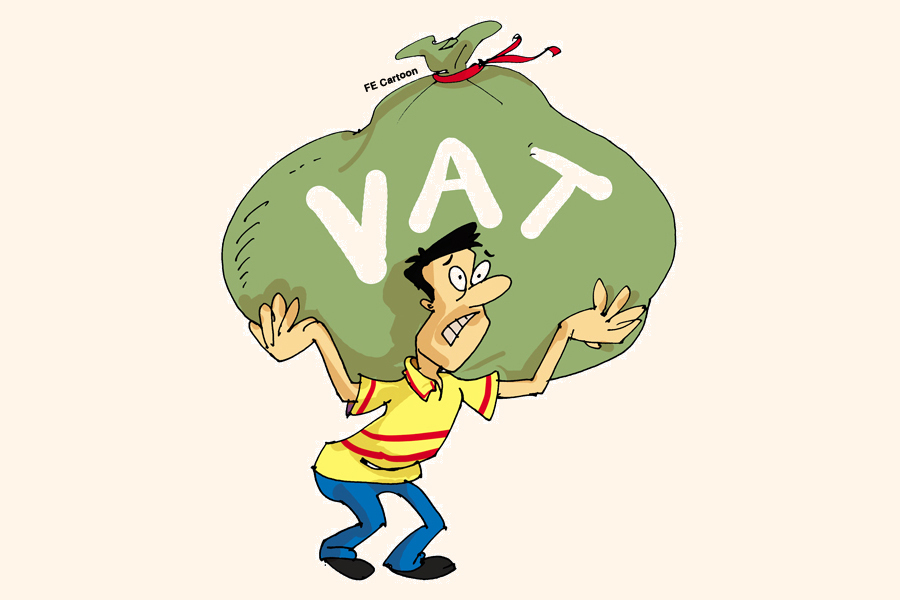
Published :
Updated :

The proposed substantial increase in indirect taxes, such as the value-added tax (VAT), for the next fiscal year is a cause for concern amid persistent inflation. Despite the implementation of contractionary monetary policy, there are no signs of inflation cooling down. Recent reports indicate that the finance ministry and the National Board of Revenue (NBR) are gearing up to boost revenue from VAT and supplementary duties on goods and services from the upcoming fiscal year.
A recent NBR report NBR says it proposes to collect an additional Tk 94 billion in VAT during the fiscal year 2024-25. Another news report reveals the finance ministry aims to generate approximately 51 per cent more revenue from VAT and supplementary duties next fiscal year compared to the target set in the revised budget for the current fiscal year. As a result of these proposed VAT tax hikes in the coming fiscal years, it is feared the hardship of low and middle-income earners will worsen.
The NBR has already slapped 15 per cent VAT on metro rail ticket prices, effective from next fiscal year. This will make metro rides costlier. Moreover, the way the tax department went after private universities to collect income tax by freezing many of the universities' bank accounts just before Eid-ul-Fitr raised many disapproving eyebrows. While it was claimed that tax was only being imposed on the income of private universities, it is highly likely that the universities would pass it on students, making education costlier. It is also anticipated that VAT concessions and exemptions for local industries would be reduced in the coming fiscal years. Consequently, any increase in production costs will invariably result in higher product prices by consumers.
Undoubtedly, there is a pressing need to ramp up revenue collection to fund the ever-expanding national budget and reduce dependency on foreign loans to meet fiscal deficits. Tax collection is the primary means of generating public revenue. However, unlike many countries where direct taxes, such as income tax, constitute the primary source of government revenue, Bangladesh heavily relies on indirect taxation like VAT. In the last fiscal year, indirect tax collection accounted for 66 per cent of the total tax revenue.
Revenue collection through increasing VAT, however, is regressive as it typically applies uniformly to goods and services, regardless of the income level of the consumers. Since lower-income individuals spend a larger portion of their income on essential goods and services, such as food and utilities, an increase in VAT can disproportionately affect them. This means that lower-income individuals may end up actually paying a higher percentage of their income in taxes compared to higher-income individuals, making VAT increases regressive in nature.
On the other hand, a progressive tax system is where the tax burden increases as income levels rise. Those with higher incomes pay a larger percentage of their income in taxes compared with those with lower incomes. This approach distributes the tax burden more equitably by placing a greater financial responsibility on those who are more financially capable. In a word, while progressive taxes aim to promote fairness by taxing the wealthy more, regressive taxes do the opposite by placing a heavier burden on those who can least afford it.
Therefore, heavier the pressure of indirect taxes, wider the inequality tends to be. Adverse impact of indirect tax may well be understood from a recent study entitled, 'assessing the Impact of Indirect Taxation on Poverty and Inequality: A Pseudo-Panel Data Analysis on Bangladesh and Global Insights from Cross-Country Panel Regressions'. The study provides evidence to show that higher indirect tax burdens significantly contribute to increased rates of poverty and wider income inequality. Conducted jointly by the Research and Policy Integration for Development (RAPID) and the International Growth Centre (IGC), the study reveals that one percentage point increase in the indirect tax burden results in 0.42 percentage point rise in poverty and 0.1 percentage point increase in income inequality. Meanwhile, the Gini coefficient, a measure of inequality, rose from 0.458 in 2010 to 0.499 in 2022, indicating Bangladesh's alarming slide towards extreme inequality.
To address the widening income inequality, stakeholders like the Consumer Association of Bangladesh (CAB) have been demanding more focus to be directed towards increasing direct taxes. Time and again, it has been pointed out that Bangladesh's tax-to-GDP ratio of around 8 or 9 per cent is the lowest globally. By contrast, Nepal boasts a 14 per cent ratio, while India maintains approximately 15-16 per cent. Notably, Nordic countries including Denmark, Finland, Iceland, Norway and Sweden have high tax-to-GDP ratios ranging from 60 to 70 per cent, which enable them to support welfare-centric government expenditures aimed at societal benefit and equity.
In spite of the country's dismal record of income tax collection, Bangladesh stands as one of the world's leading nations in generating super-rich individuals. Many of those who leverage their power to amass vast amounts of wealth through unscrupulous means often evade taxes. Moreover, over 60 per cent of the country' nearly one crore Tax Identification Number (TIN) holders did not submit their returns for the last fiscal. This issue is further exacerbated by the concentration of tax contributors primarily in urban centers like Dhaka, leaving vast segments of rural businesses unaccounted for in tax collections.
The government, therefore, has ample scope to boost revenue collection from direct sources by checking tax evasion and broadening tax bases, rather than increasing the burden of indirect tax on the general people. It is time to correct revenue collection strategy by embracing progressive taxation, instead of pursuing regressive methods.
aktuhin.fexpress@gmail.com


 For all latest news, follow The Financial Express Google News channel.
For all latest news, follow The Financial Express Google News channel.